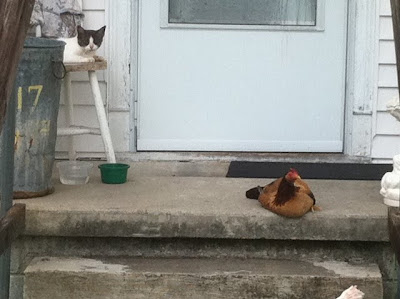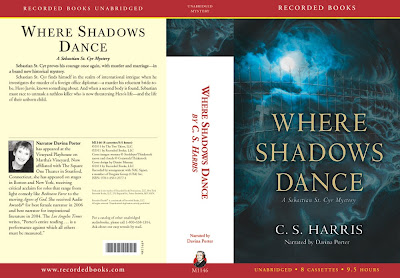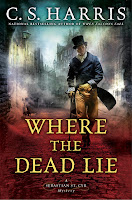
Amazon.com has a feature on their book pages they call More About the Author. (“Discover books, learn about writers, read author blogs, and more. Visit Amazon’s So-and-So Page.”) It’s something authors need to set up themselves, with the result that every time I visit Amazon and am reminded of this feature’s existence, I get a nasty sinking feeling. It’s the same harassed niggling I experience whenever I realize just how big the weeds in my poor neglected garden have grown, or when I quickly close the door on a closet while thinking,
Someday I have got to clean that thing out. I guess you could call it that I-know-I-need-to-do-this-but-oh-jeez-I-don’t-have-time-and-I-know-it’s-going-to-be-a-hassle feeling.
Well, today I decided, That’s it; I need to set up an Amazon Author page so that readers can find all the books I’ve written under my various names. Whereupon I was quickly reminded of why I avoid things like this.
I began by metaphorically rolling up my sleeves and going to the page for
Where Shadows Dance on Amazon to click the “Are you this author?” link. Down the rabbit hole we go.
First, I typed in my email address. But because that email addy is linked to my Amazon account under my own name, Candice Proctor, the system automatically pulled up all my Candice Proctor historical romances and asked, “Are these your books?” Oh, this is easy, I thought. When I replied, “Yes,” they told me they would need to verify my email address with my old romance publisher. But once that was done, they assured me, I could add any of my other books that hadn’t come up.
Sounds simple, right? So, while waiting for Random House to respond to Amazon’s inquiry, I merrily set about uploading a short bio and photo to my new author page. Random House obviously responded quite quickly, because I soon got a little ding from my inbox telling me all systems were go.
Except they weren’t.
As I quickly discovered, Amazon only allows you to list books on your author page that are written under that name; you need to create separate author pages for each pseudonym. Only, when I tried to do that, I hit a snag. I wrote Amazon an email. “Since the system does not allow different pseudonym pages to be merged, how do I create multiple author pages using one email address? In other words, I would like to create pages for C.S. Harris and C.S. Graham, but when I try to sign up using my email address, I am immediately taken to the Candice Proctor page.”
I received a quick, friendly, cheerful response:
Hello,
I'm sorry for any inconvenience caused. Yes, as you mentioned, we aren't able to merge Author Pages for those who write under more than one name. However, Author Central allows you to manage up to three pen names within a single account. You can manage both of the Author Pages from your current Author Central account. Here's how:
1. Log in to Author Central (https://authorcentral.amazon.com).
2. Click the "Books" tab located on the top of the page.
3. Click on the "Add more books" link that appears under "Are we missing a book?"
4. Search for books written by [PEN NAME] by title, author, or ISBN.
5. Click "This is my book."
Once we verify you're an author of the book(s) selected, a second/third Author Page will be available for you to maintain.
In order to switch between pen names in Author Central, select the drop down symbol to the right of your name in the upper right hand corner where it says “Hello [CURRENT PENNAME CLAIMED].” When you select the name you wish to access, you will be brought to the corresponding Author Central dashboard.
We appreciate your feedback and may consider cross-referencing Author Pages with one another in the future. If you have any more questions or concerns, please contact us by clicking on the following link. I hope this helps! We look forward to seeing you again soon.
Well, isn’t that cute? I get to maintain not one but three author pages (if I had four names, I'd be out of luck), each of them only showing the books I’ve written under that particular name. Since the object of this entire exercise was to help readers find all my books, I’m not a happy camper. I decide to write a second email telling Amazon I understood the setup, but maybe they ought to give some thought to changing their system to allow all books to be listed on each page, as well as simply cross-referencing the pages.
The response I receive is considerably less cheerful and friendly than the first, although they’ve obviously learned the old Be Sure To Use “I” Statements When Being Assertive To Avoid Making the Listener Feel Defensive Rule, because they write, “I understand you're upset and I regret that we haven't been able to address your concerns to your satisfaction.” They then repeat the instructions for setting up multiple pages [Duh! Got it the first time, people!] and end by saying, “We won't be able to provide further insight or assistance for your request.” In other words, Go away now and quit bothering us!
Do you think they'd be nicer if I were Dean Koontz or Ruth Rendell?
Anyway, I now have the Candice Proctor author site up. I’ve dealt with their no pseudonymous books rule by mentioning the Sebastian books in my bio, adding a link to the csharris.com website, and putting up the video for
Where Shadows Dance. I’m still waiting for Penguin and Harper Collins to verify that I am me, after which I get to do this two more times.
In the meantime, I’ve written less than one and a half pages today.









